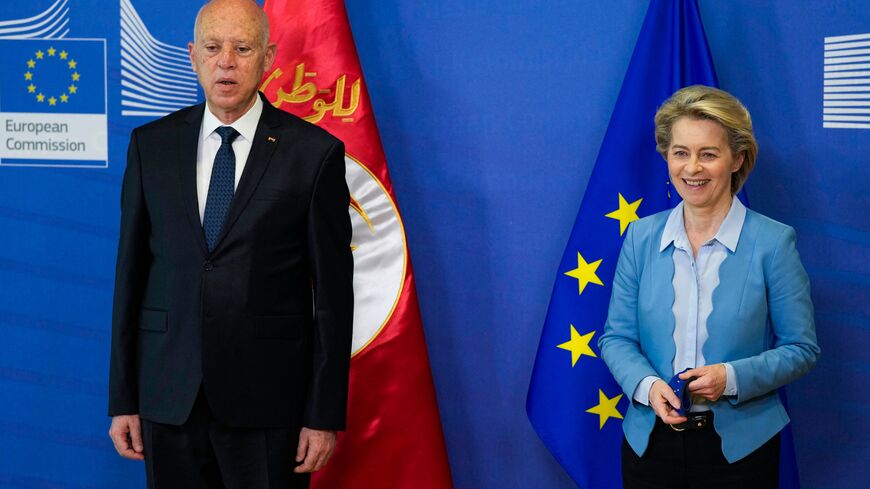Intervening in Tunisia’s International Monetary Fund (IMF) bailout talks and pledging aid to the North African country will not reduce the steady flow of migrants crossing the Mediterranean Sea to seek refuge in Europe, experts have told Al-Monitor.
Italian Prime Minister Giorgia Meloni and her Dutch counterpart, Mark Rutte, visited Tunisia over the weekend along with European Commission President Ursula von der Leyen, looking to make progress in unblocking IMF loans to the country. Talks between Tunis and the IMF have been stalled for months amid a financial crisis, with Tunisia’s populist President Kais Saied rejecting the economic reforms needed to enable the loans. The European Union has said that it would support Tunisia on the condition that the country finalizes the IMF bailout.
It marks the second time Italy’s far-right leader has visited Tunisia in a week. Italy is the main country in Europe where immigrants arrive from the Mediterranean Sea on small boats from countries such as Tunisia, Algeria, Morocco and Libya. The Italian government has reported that as many as 400,000 people are forecasted to enter Italy from North Africa in 2023. There has been a surge in the number of people making the perilous journey this year, particularly from Tunisia.
On the weekend visit, the main interest of European countries was to improve conditions in Tunisia, which they hope will stem the sharp rise in the number of migrants arriving in Europe. The EU is considering providing more than €1 billion ($1.7 billion) in aid to Tunisia to rescue the country’s finances and help it deal with the migration crisis, von der Leyen said during the Sunday visit. Von der Leyen said that the funds could be ready “as soon as the necessary agreement is found,” without giving a precise timeline as to when they will be available.
As part of that package, a further €105m will be invested in a new partnership with Tunisia to combat people smuggling, human trafficking and illegal sea crossings.
Ghazi Ben Ahmed, founder of the Brussels-based Tunisian think tank Mediterranean Development Initiative, said that such an agreement would do little to stem migration numbers to Europe because he does not believe Saied’s government can control illegal migrants.
“We saw some videos where our (Tunisia’s) coastal guards were hitting migrants on their boats in the middle of the sea. So maybe it will become even more brutal at some point. But still, they will not prevent this,” Ben Ahmed told Al-Monitor.
1. A robust 🇹🇳 economy;
We are considering up to €900M macrofinancial assistance & up to €150M in budget support.
2. Increased trade & investment
3. Mutually beneficial energy cooperation
4. Addressing common migration challenges
5. Bringing our people together#TeamEurope pic.twitter.com/araemd0BUq— Ursula von der Leyen (@vonderleyen) June 11, 2023
He said that using police and the army to deter the small boats was not the solution — a comprehensive development package with the EU would do better to reduce the numbers. Such an agreement would include how to deal with illegal and legal migration, as well as mobility, education and development, he said.
“So the EU and Tunisia have to sit around the table and discuss a comprehensive package. That's the only way,” Ben Ahmed added.
He said that the migration will not stop in part because neighboring Libya is not stable and elections are probably not on the horizon anytime soon.
“Tunisia is not resuming its economic growth,” Ben Ahmed added. “The current government and the president are unable to reinvigorate the economy. So the situation will continue to deteriorate with more and more prohibitive loans to be taken by Tunisia and putting our foreign debt at prohibitive levels reaching soon 100% of the GDP.”
He said although those conditions are not sustainable, Saied plans to keep it that way at least until the Tunisian elections toward the end of next year.
Sofiane Makhloufi, a former Tunisian lawmaker who was elected in the 2019 parliamentary elections to sit in the Assembly of People's Representatives, said a solution to the migration crisis must involve a reformation of security in the Mediterranean, including cooperation at the sea’s three borders — the north (Southern Europe and Anatolia), the south (North Africa), and the east (the Levant) — but he could not see that happening soon.
“But the Europeans have to understand, too, that when they support a dictatorship like Kais Saied’s, they are not helping us find a solution for the medium and long term,” Makhloufi told Al-Monitor. "The question is not whether this year or the next year will we have 15,000 or 20,000 crossings — the problem is really in 10, 15, 20, 30 years’ time.”
He said he does not believe the EU’s current offers to Saied’s government will stop the boats from coming to Europe's shores.
“Giving [Saied] a couple or a few hundred million [euros] does not solve Tunisia's problems,” Makhloufi added.
Since Saied won the 2019 election by a landslide, as part of a power grab in 2021 he moved to rule by decree, dissolved parliament and silenced critics.
Makhloufi pointed out that in 2020, when he says Tunisia was more democratic, there were 10,000 illegal crossings a year in the Mediterranean.
“Now, with Kais Saied, we have more than 30,000 people [crossing the Mediterranean every year on small boats]. … Young people in Tunisia … are fed up. They haven't got a job; they haven't got freedom — and anyone who writes something on the internet or anything could get one or two years in prison,” Makhloufi said.
He said that if Tunisia returns to respecting democracy and human rights, illegal immigration on the Mediterranean will decrease.
Ahead of the European leaders' Sunday visit to Tunisia, Saied said on Saturday that the North African state would not accept becoming a border guard for other countries.
That being said, a first draft of a Turkey-style border agreement will be available at the European Council in Brussels at the end of this month, Ben Ahmed said. In March 2016, Turkey signed a "statement of cooperation" with the EU to stop refugees (mainly Syrians) from coming into Greece in exchange for billions of euros in funding from the European bloc. Those who arrive in Greece or other European countries from Turkey would be returned there. For every Syrian returned from the islands, EU member states would accept one Syrian refugee who had been waiting inside Turkey.
The expert said he believed Saied's rhetoric was aimed at parts of his voter base, but in reality, he will eventually agree to an IMF deal and a Turkey-style arrangement.
“He's addressing his constituency, the Tunisians, trying to convince them that he is adamant — that he is not abiding or saying yes under pressure. So it's a game,” Ben Ahmed said.
Fitch Ratings on Friday downgraded Tunisian debt further into junk territory, warning of the possibility the country might default on its loans, which could deepen the economic crisis. European countries are concerned that an economic collapse could worsen migration to Europe from the country.
Saied has warned that cuts to state subsidies and restructuring of state-owned enterprises, which Tunisia proposed to the IMF to reassure lenders that they would be repaid, could ignite social tensions in the country. Meloni has pressured the IMF to relax the conditions of the loan for Tunisia.








